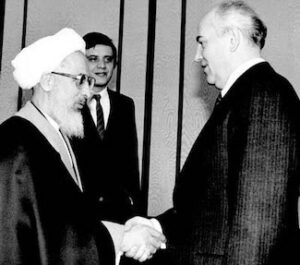By Oved Lobel, Middle East Quarterly

Ayatollah Javadi Amoli (left) meets with Mikhail Gorbachev, January 1988. The Iranian delegation delivered a personal letter from Iran’s Khomeini urging the Soviet leader to consider Islam as an alternative to communism.
Analysis of Iranian activities since 1979 has been plagued first and foremost by the misperception that the system established by Ayatollah Ruhollah Khomeini was ever meant to be limited to Iran. In fact, once conquered by the ayatollahs, Iran became a weaponized theocracy that rejects the idea of the nation-state and serves as the vanguard of an Islamic juggernaut to replace all nation-states with a worldwide community of believers (umma.
Khomeini’s system and conduct can best be understood as a Soviet Union in Islamic garb. Analyzing the Islamic Republic’s activities through the lens of Soviet imperialism is not only useful for its parallels—from its Islamic Comintern to its use of “united fronts” for political subversion and conquest—but also because it is the Soviet-Iranian competitive cooperation of the 1980s, which transformed into a Russo-Iranian strategic alliance in the 1990s, that accounts for much of the revolution’s success in metastasizing. And while the revolution may adjust its military and political levers to the vicissitudes in regional and global affairs, its overriding goal remains uncompromising and immutable. In Khomeini’s words:
The Iranian revolution is not exclusively that of Iran, because Islam does not belong to any particular people … We will export our revolution throughout the world because it is an Islamic revolution. The struggle will continue until the calls “there is no god but Allah and Muhammad is the messenger of Allah” are echoed all over the world.[2]
In this goal, Russia plays a counterintuitive but significant role.
Continue reading the full article>
Oved Lobel is a policy analyst at the Australia/Israel & Jewish Affairs Council.



https://www.youtube.com/watch?v=LJNtfyq3TDE. Everyone should watch this video inorder to understand the Russia-NATO conflict over Ukraine. The commentator is someone who call himself Johnny Harris. While I know nothing about him, he is very well informed, and his analysis of the conflict is very persuasive.
His basic points are that a) Putin considers the break-up of the Soviet Union to be “the greatest tragedy of the twentieth century,” and that historically and ethnically, Ukraine and Russia are one people. He believes that Russia actually began as Kievan Rus in the Ukraine (c. 860-1200 c.e.). Only sinister Western influences have kept Ukraine from rejoining the Russian motherland. c) He wants the former Soviet “satellite” countries of eastern Europe to cease to be part of NATO and instead by returned to Russia’s sphere of influence.
The NATO countries, by contrast, are status quo powers who feel very threatened by Putin’s stated desire abandon the 1991 settlement when the Soviet union collapsed, in which Ukraine and the other non-Russian Soviet republics became independent. The “old NATO’ countries of western Europe have promised to guarantee the security of the “new NATO” countries of eastern Europe that joined the alliance after 1991. Putin’s desire to return the East-West division of Europe to roughly what it was in 1989, before the Soviet withdrawal from eastern Europe, is not something that the NATO powers will accept. Rightly or wrongly, countries and governments do not voluntarily surrender their spheres of influence the they receive ultimatums that they do so by another countries.
What those who say that Putin’s demands are reasonable and NATO should accept them don’t understand is how governments have always responded when another government issues an ultimatum to them to withdraw from territory and allow the “revisionist” state to expand its territory by force. Rightly or wrongly, that’s just the way it is and always has been in international relations. That is why Putin’s issuing of ultimatums places the whole world at risk.